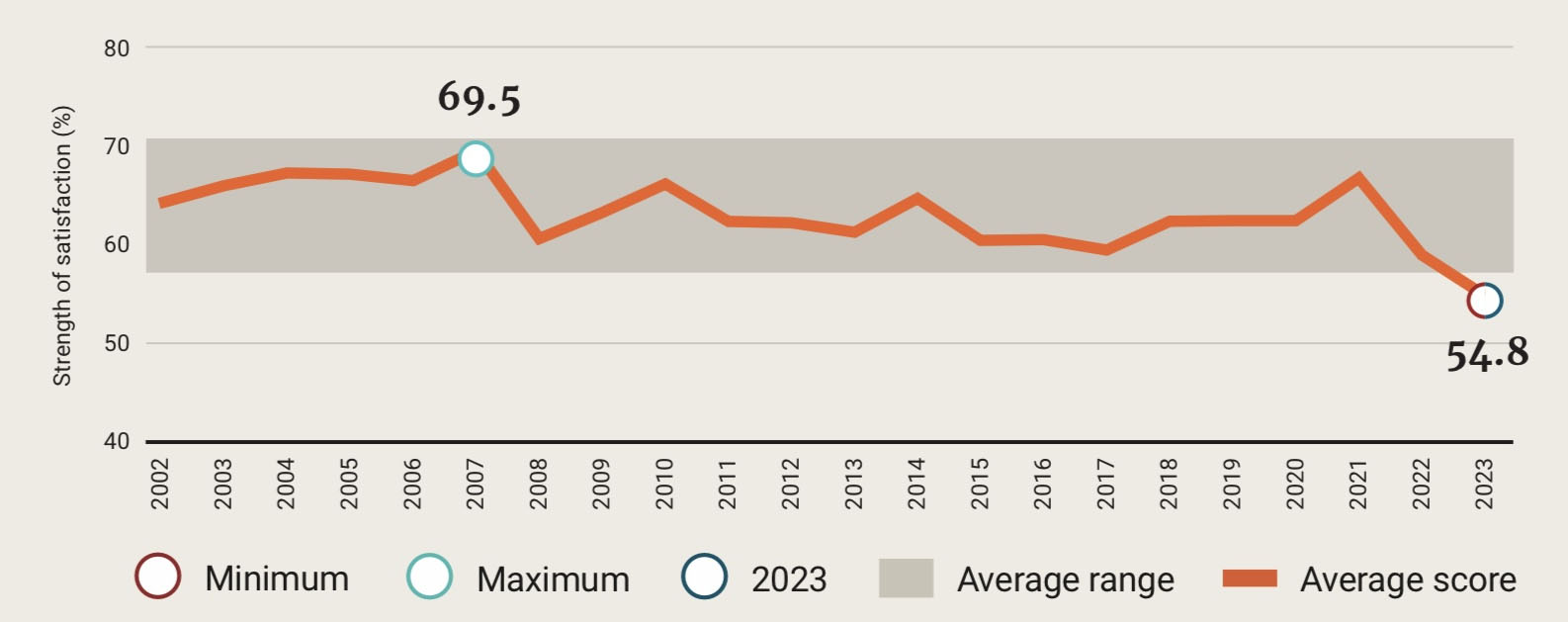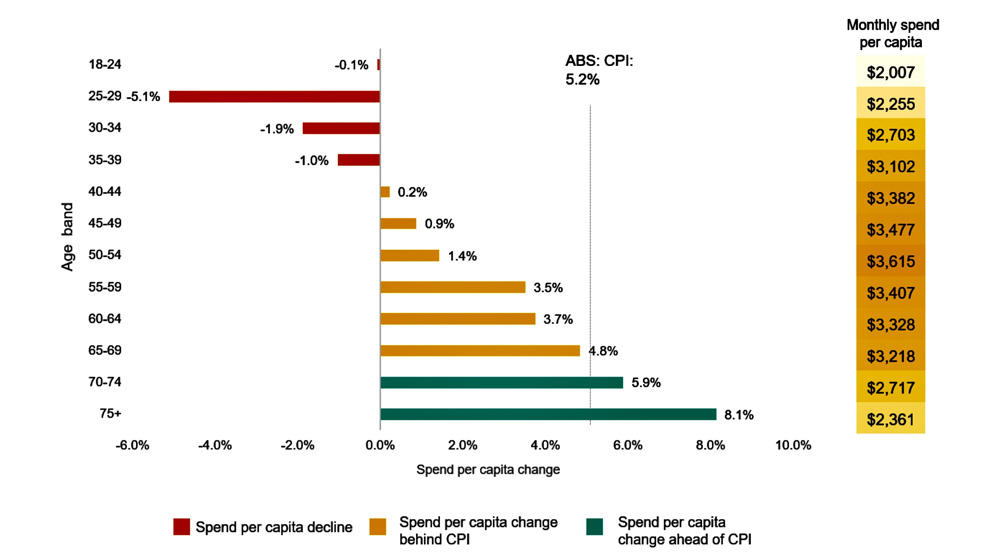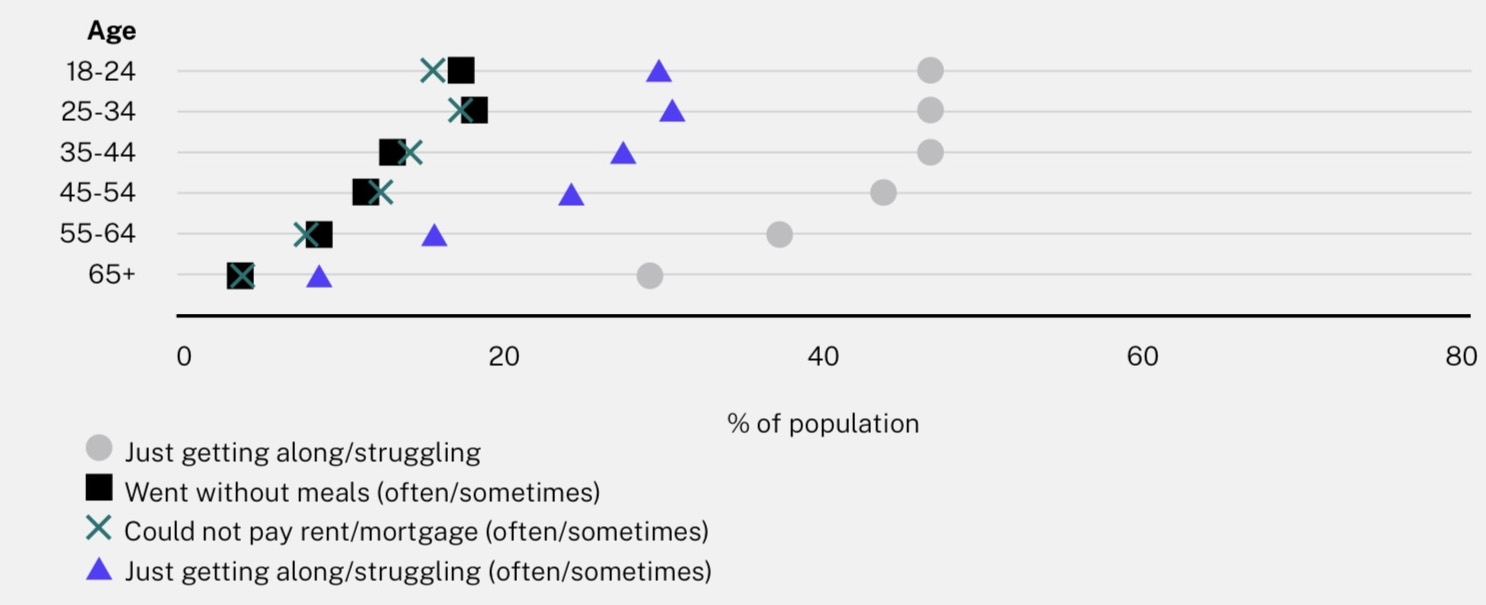
‘When will there be good news?’ is the title of a crime novel by the English writer Kate Atkinson. If recent economic and social data are any indication, it’s also the question many younger Australians are asking as 2023 draws to a close.
The Australian Unity Wellbeing Index prepared by Australian Unity and Deakin University is an annual survey of the state of Australians’ wellbeing. It recognises the importance of the ‘golden triangle of happiness’ comprising the three areas of life that contribute to life satisfaction – financial wellbeing, good personal relationships, and a sense of purpose.
Unfortunately, financial wellbeing is not looking too good right now. The latest survey reveals that the economic satisfaction of Australians is the lowest ever recorded in the 22-year history of the wellbeing index. It’s significantly lower even than during the global financial crisis.
Satisfaction with the economic situation

Source: Australian Unity/Deakin University
In the words of the lead researcher Dr Kate Lycett, ‘Australians are feeling worried about the economy and financially stressed’.
But not all Australians are suffering equally. According to this research younger adults were markedly less satisfied with the economic situation than older ones.
The latest Cost of Living Insights Report from CommBank iQ, based on the spending patterns of seven million Australians, paints a similar picture. For the quarter to the end of September the amount spent by Australians on essential goods and services rose, but at a rate below inflation. Discretionary spending was flat.
One of the most telling revelations in the report is the stark differences in spending patterns across the various age brackets. According to CommBank iQ, there was a 5.1% decline in total spending for 25- to 29-year-olds but an 8.1% increase for those over 76.
Spending per capita growth between age bands

Source: CommBank iQ
The 25 to 29 cohort was the only one that reduced both essential and discretionary spending. This likely reflects a combination of cash flow difficulties and uncertainty about the short-term economic outlook.
Interestingly, in spite of this general contraction, twentysomethings still managed to fund a 13% increase in ‘entertainment expenses’. That will fuel the regrettable view of many smug baby boomers that the ‘smashed avocado’ generation would be fine if they’d just stop splashing out on luxuries.
The position of younger Australians is likely to have deteriorated further since the September quarter covered by the CommBank iQ report. The intervening period has seen on-going inflation, a continuing rise in rents and house prices, and yet another interest rate hike by the Reserve Bank of Australia.
Further evidence of rising economic anxiety and the emerging generational divide can be found in yet another recent report – Mapping Social Cohesion 2023. This report presents the latest research on ‘social cohesion’ from the Scanlon Foundation Research Institute, Monash University, ANU, and the Australian Multicultural Foundation.
According to the report, ‘financial and cost-of-living pressures have been affecting an increasing number of Australians over the last two years’. In that period, the percentage of people who self-describe as poor, ‘struggling to pay their bills’, or ‘just getting along’ has risen from 31% to 41%.
Nearly 50% of people now view economic issues as the country’s most important problem.
And once again, it’s younger Australians who are bearing the brunt of the pain.
Indicators of financial stress for age groups, 2023, Life in Australia TM

Source: Scanlon Foundation
You might expect financial stress to be greatest among the 18-24 and 25-34 cohorts because they’re in the early stages of their financial life, the period when they take on major financial commitments like buying a home and having children. However, a research paper published this week by Accent Research entitled Gen-Z are different undermines this reasoning.
That paper shows that Gen-Z, and to a lesser extent Millennials, are reaching life’s major milestones at a later stage than earlier generations. Therefore, much of their financial stress is not related to those milestones.
The last four years have been challenging – a global pandemic, the return of inflation, rising interest rates, and now subdued economic growth. Many of those worst affected have been younger Australians.
There have always been generational divides but the one currently emerging may prove to be consequential, both economically and politically.
Dr Kate Lycett from the Australian Unity Wellbeing Index argues that ‘if we are going to boost Australians’ wellbeing, we have to see a change in the economic situation of the country, and one that prioritises the wellbeing of younger Australians’.
To date, there’s little sign of such a priority among politicians. But that may change if the predicament of younger voters starts to have an impact at the ballot box.
*Ross Stitt is a freelance writer with a PhD in political science. He is a New Zealander based in Sydney. His articles are part of our 'Understanding Australia' series.
13 Comments
I wonder if there is an equivalent measure of the NZ population and what percentage would self-identify as “struggling” etc. 41% up to 50% seems to be a big jump to me. I suspect our figures would come in much higher.
The problem with such measures is, they're all subjective. Todays struggling, is our grandparents', or great grandparents' idea of abundance. But the disconnect is now so great, few if any have any perspective of it.
Agreed, what the next generation just assumes as standard what was the grandparents luxury items. The new "Normal" is what is causing the problems, $2000 phones, cars you name it. After all the apparent "Must haves" they wonder why they are struggling.
I wonder how many of our grandparents struggled to afford a roof over their head...or support kids while doing so? ..Anyone?
Home ownership rates were low until the 50s when the government part financed mortgages for state house level homes. Families were larger and people had less.
People had less but a roof over there head...Sundays off, and Mum generally at home...but yer it was hard. At least we have a visionary new 3 headed government with vision to get us back to the future.
These are people that went through a depression, then a war. The country lacked availability of decent affordable housing through most of the early 20th century. Basic food items rationed until even the early 50s. If you could afford a car, you'd have to wait.
Following World War II, this generation experienced immense economic growth and prosperity. The state of affairs afforded them the golden opportunity to accumulate much wealth in their lifetime. Boomers—born between 1946 and 1964—are currently the wealthiest generation on the planet
"How many times have we been down this road on this site"?
I guess a big eye opener for me is encountering people, either old or abroad who are materially significantly less well off than our least fortunate, who just happily accept their lot, rather than lament the Universe didn't put them in the absolute best spot to be a human, ever.
They had 20 years of boom in the shadow of a war and the advent of suburbia and consumerism. And we are in the shadow of that. And that's all some people ever seem to contrast with. Understandable, given it's most people's only point of reference.
A Star Trek future, or an Elysium future?
Bullshit. I am a GP, drive a 2008 car valued at 5k, my partner drives an 09 car valued at 4.5k, both our phones are mid-tier bought in 2019, we have few material luxuries. We are a young family and cannot afford a house in Auckland, not because of excessive spending.
Absolutely, I was brought up in the immediate post ww2 period. I remember my parents buying our first frig. Ditto an electric washing machine, which relieved my Mum's regular Monday stint firing up the"copper" to boil the clothes, push through the hand powered wringer into the concrete soak tub for a dose of"blue" to whiten the whites. Most clothes, hand made, and with embarrassment of going to school (bare footed) with patches on our trousers.
And this was a middle class family living in a good suburb. We just didn't know how under privileged we were!
As has been said the current debate is without any comparable reference. My kids just expect their first home will be at least as good as our final retirement home, but complete with a full range of top of the range whiteware.
All depends on perspective,...and realization that many decades of foreign exchange deficits means NZ is a significantly poorer nation. Champagne tastes on a beer income may have to stop.
Funny how we have so much choice and opportunity today in comparison: leaving the phone in the car and going hiking, fishing, swimming at the beach with family/friends, being in a peaceful spot in nature, away form the cities and suburbia.

We welcome your comments below. If you are not already registered, please register to comment
Remember we welcome robust, respectful and insightful debate. We don't welcome abusive or defamatory comments and will de-register those repeatedly making such comments. Our current comment policy is here.